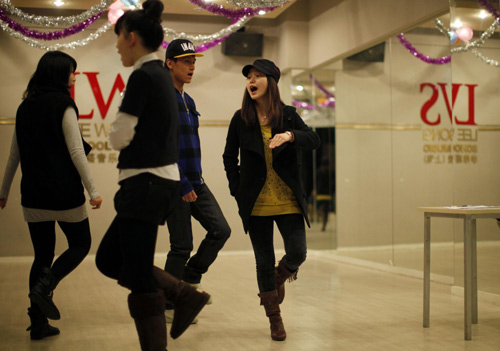Society
Music talent school fuels superstar dreams
(Agencies)
Updated: 2010-12-08 10:48
 |
Large Medium Small |
 |
|
Students attend a drama class at the Lee Wei-song School of Music in Shanghai, Dec 7, 2010. [Photo/Agencies] |
SHANGHAI - A love for singing and a lust for stardom pushed 20-year-old Qian Yue to take a break from her university studies to learn music full time at the Lee Wei-song School of Music in Shanghai.
For almost a year, the cheerful Yunnan native from the southwestern city of Kunming has been taking a combination of voice, dancing, and keyboard lessons to fulfil her dream of becoming a singer, inspired by a recent flood of TV talent shows.
|
||||
"I watched those talent shows in the past and I always had a favourite contestant. So after a while I thought that was quite good and I wanted to give it a try myself."
The music talent school offers a full time course for its "Asian Music Artist" class, with students taking in about four hours of different classes every day including voice training, studio recording, keyboard skills and dancing.
As Qian works hard with her vocals at the recording studio in the school, more than ten other students are spread out in classrooms throughout the day, picking up the necessary repertoire in their pursuit of becoming a music artist.
When she takes a break from the recording, her studio teacher reviews her singing and gives her tips on how to improve her vocal range, voice quality and emotional involvement in a song.
Talent shows have been the rage in China since the success of the "Super Girl" national singing competition organised by Hunan satellite television from 2004.
The musical talent show was basically a Chinese copy of the popular UK show "Pop Idol" and has since spun off other forms of singing and dancing competitions on local and national TV.
Chinese television has become more market-oriented in recent years and such talent shows have helped push ratings to all-time highs despite criticism from officials on the nature of such shows and their negative impact on society.
This year, Shanghai's Dragon TV pushed its own "China's Got Talent" show, the local version of the UK series "Britain's Got Talent", to the top of its audience ratings chart.


